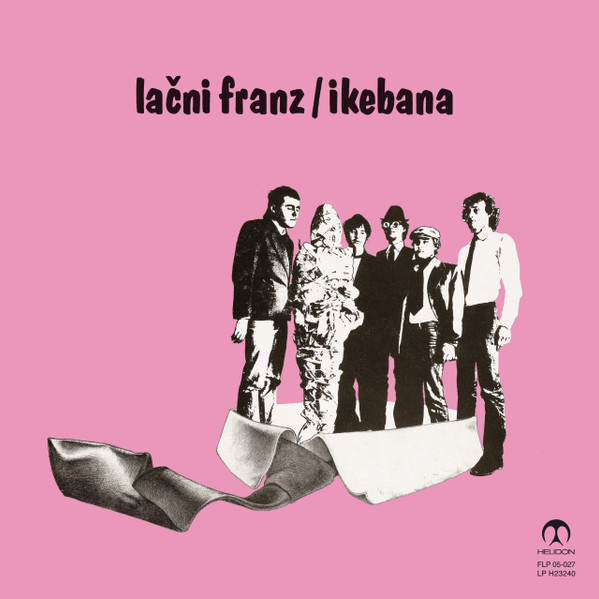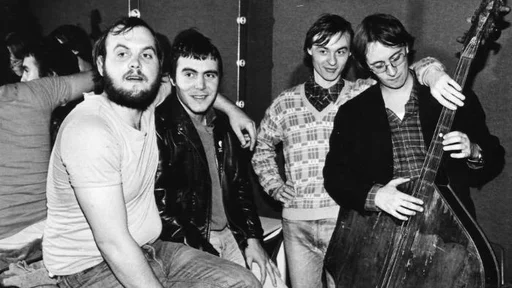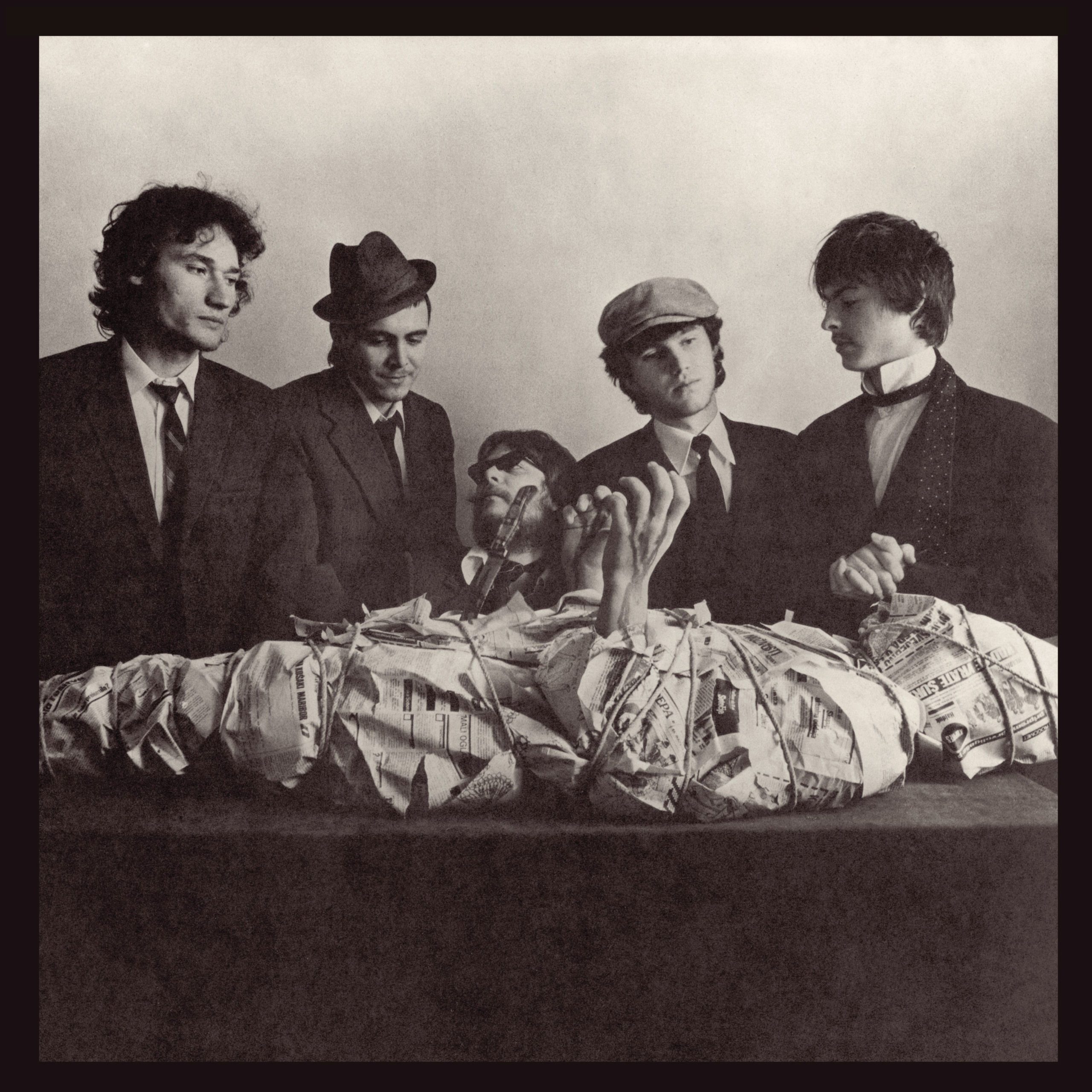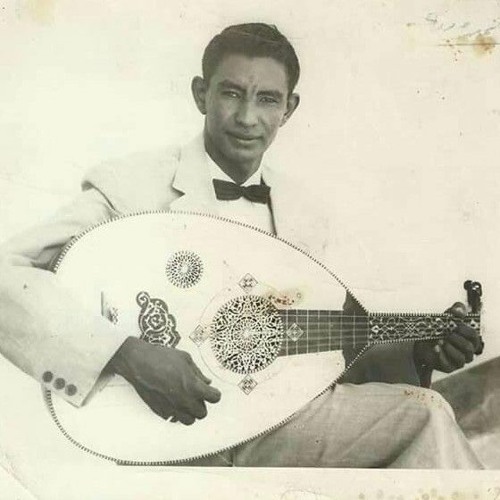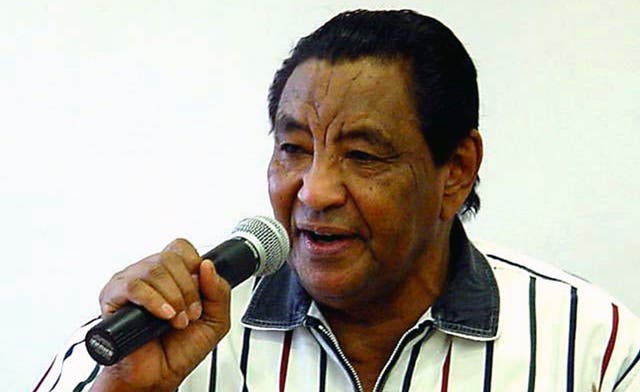Welcome to the Dugongo's Bazar
the only place on the net where you can find hidden music gems from all the world countries beyond the usual conventional routes! The Dugongo will guide you to the most remote corners in search of unconventional sounds, forgotten musical scenes and legendary artists, unknown outside their borders.
Saturday, 1 June 2024
Maitre Gazonga & L'International Challal - 1984 - Les Jaloux Saboteurs
Xamdam Sobirov - 2023 - Tentakcham
Xamdam Sobirov - 2023 - Tentakcham
Xamdam Sobirov was born on January 6, 1989 in a village in the Navbahor district and graduated from the Tashkent State Art Institute.
In 2011 he founded the vocal trio Mango, with peers Oybek Sangin and Azizxon Saydumarov. It is a pop project over which the three have little control (they are based at Nevo Music, the largest local label together with Riza Nova), but despite a certain diffusion in the media, the hoped-for profits do not arrive, so much so that the artist is going through a period of economic difficulty.
His fourth studio work was finally released on April 17, 2023 (preceded by an EP and two albums): it contains the single mentioned above, plus others published periodically in the last couple of years.
Sobirov himself composes nine out of thirteen songs (the remaining four are signed by his young colleagues), while the arrangements are almost entirely handled by Doniyor Akhmedov, house producer and member of the Dndm project, which also boasts a cult following in Europe, at least among club music fans.
https://www.ondarock.it/recensioni/2023-xamdamsobirov-tentakcham.htm
TRACKLIST:
1. Gavharim
2. Esla Meni
3. Nega Og'ritar Dilim
4. Ona Qizim
5. Maktabimda
6. Onaginam
7. Sumaya
8. Tentakcham
9. Qishloqqa Qayt
10. Sumbula
11. Yaxshi Ko'rsam Nima Qipti
12. Yengildim
13. 20-Mart
Credits:
Composed by: Xamdam Sobirov, Uzmir (track 3), Shohjahon Ergashev (track 4), Mirjalol Nematov (track 6), Malik Ergashev (track 9)
Arranged by: Doniyor Akhmedov
Published by: Nevo Music
Tuesday, 27 February 2024
La Mona Jiménez - 2005 - Trilogía 1er acto
La Mona Jiménez - 2005 - Trilogía 1er acto
Juan Carlos Jiménez Rufino, popularly known as La Mona Jiménez, is an Argentine quartet reference. He was born on January 11, 1951 in the city of Córdoba, Argentina. He is one of those people for whom a presentation falls short. One of those national figures who just by seeing him you know who he is, just by listening to him your body begins to move and a smile appears. Jiménez, as they call him in his native land, La Mona as he became known throughout the country or simply a “Neighborhood Boy”, in his own words. Juan Carlos Jiménez Rufino began to relate to art at a very young age. Grandson of a grandmother from Catamarca, son of a father from Tucumán and a mother from Salta, the different influences of our Argentina would begin to be sown in him to, in the near future, bear fruit. Folklore, Tango and, later in time, Rock, were breathed in his home. He was always sung and danced, in equal parts, realizing the integral artist who was approaching. So much so that at the age of 10 he was part of a folkloric ballet, becoming a second malambo dancer.
A young Carlitos Jiménez live for a presentation by the Berna Quartet.
Time did not take long to show the multiple capabilities that Carlitos had. At just 15 years old he debuted as a singer in “Berna y su Conjunto Juvenil” with the song “Diez Monedas”. This first step in professionalism ended years later, amid the differences that existed with training. Among other things, they didn't let him dance and, true to his style, that connection with the band ended. This is how he arrives at the legendary “Golden Quartet”, a group in which he was for twelve years. In his desire to continue growing, his long-awaited debut as a soloist finally arrived in 1984. A more mature Jiménez not only began to write a new page for the history of the quartet, but he was going to rewrite it forever.
With more than fifty-five years of singing as a quartet, he has almost a hundred albums in his work, more than 1,200 songs, 29 gold records, 8 platinum records, 2 double platinum records, and more than twenty-seven years of playing live from Tuesday to Sunday, around 10,000 live shows. That is Jiménez, a tireless and immense artist because of his work and dedication, but also because of his bond with the people. In the words of the renowned Afro-Peruvian percussionist Bam Bam Miranda (RIP) “He has no audience, he has accomplices . ” That complicity with the people was built through Jiménez's gestures, which have been innumerable over the years, from the material to the intangible. Recognized are the raffles on his birthday where he gave his followers motorcycles, cars, apartments, cash, a house and even taxis, yes, thinking of generating a source of work.
But there are also those gestures that fill the heart with recognition, and La Mona came to invent her own sign language to greet each person who comes to accompany her. Just by seeing the sign made to him from the audience, Jiménez repeats the gesture and names each neighborhood, city or province.
In the words of his son Carli Jiménez “Although the tarantella and the double step are the origins of the quartet, musically, in the way of interpreting it, living it and dancing it, European colonialism is not present (...) It is obvious , the color of the skin, the curl of the hair, the wide noses. Look at my old man. In the way of dancing it, how the legs move, the body, it is more of an African dance than dancing a tarantella or a double step.”
If we do a brief review of some songs we can see how he made it clear on multiple occasions: “ Oh, God, I ask you / Don't forget / About my race, black race / Don't forget / Fire in the blood / strength in the soul, hunger for freedom / murmur of a black song / that springs from the skin” (Raza Negra, 1994). Or later in time with songs like El negro no es un cabrón : “El negro was a slave, in the century that is leaving / the black was a slave, in the millennium that is leaving / and now he feels free, very truly free and sings with joy, for so much happiness” (Bien Ah!, 1999). These lyrics are some of the many where Jiménez positions himself against different themes that oppress the majority, such as in Por portación de cara (Trilogy 2nd act of 2006), Gatillo Fácil “on one side they shoot and then ask for documents” (I live again…I sing again!, 2008).
A phenomenon that transcends generations and continues to add chapters to its history. For example, the Bum Bum Festival , organized for the first time in 2022, builds bridges and brings together established and emerging artists from different musical genres each year. In its third edition, held in Jesús María, the first official registration of Jimenero tattoos took place, and people carry them on their skin in addition to carrying them in their hearts. Happy birthday Jímenez, for many more. From heart to heart".
TRACKLIST
1 El Federal (with Gustavo Cordera)
2 Busco Un Corazon
3 Cuartetizado
4 El Beso (with Fito Paez)
5 Si He Sido Infiel
6 El Cochino
7 El Secreto
8 Derecho Viejo
9 Defiende Nuestro Amor (Envidia)
10 Se Abuso
11 Ilegal
12 Mujer De La Noche
13 El Sacudon
14 Final Del Primer
Thursday, 28 December 2023
Ariunaa - 1997 - Zövkhön chinii tukhai
Ariunaa - 1997 - Zövkhön chinii tukhai
Ariunaa ( born on March 15, 1967 in Ulaanbaatar) is an honored monglian actress and pop diva singer. His artistic career began at the age of 15, and he first became known to the public with the song "Sixteen Years". He graduated from the Bulgarian Art School (Conservatory) as a singer. So, he returned to Mongolia and worked as a singer in the Soyol-Erdene band, and in 1990, he started creating "Freelance Artist" and his works. With the Eros #1 album released in 1996, he exploded in the Mongolian music world, winning over the audience (charisma) and creating his own space. Songs such as "Утасны чинь дугаар" and "Анхны хайр" from the Eros #1 album conquered young people at that time.
A brief biography
Timur's Ariunaa was born as the daughter of Timur and Bayanjargal from Bat-Ulzii sub-district of Ovorkhangai province. He was talented in singing and dancing since childhood. Since she was a student at the 10-year secondary school No. 52 in the capital, Ariunaa has been singing in the band "Song of the Sun" under the leadership of L. Galmandakh, a famous writer of children's songs. When he was 15 years old, he sang the song "16 nas" for the first time. At the age of 16, one year later, the song was recorded in the golden fund of the Mongolian Radio. While in middle school, he won a silver medal in the art examination of the Mongolian pioneer organization and was also selected in the Soviet state singing competition. Later, she graduated from the Bulgarian Institute of Music and became a professional singer. Ariunaa started singing as an accompanist in the "Soyol Erdene" ensemble of the State Philharmonic and later became a soloist in the group. Now he is an independent artist. United Nations children's ambassador singer. Worked as a judge of the Universe Best Songs festival. Also, in 1998, he established the Holy Heart NGO, which focuses on disabled children, and created a foundation for children with poor life opportunities who have become part of society. His contribution to special schools for children with disabilities was so great that the foundation was discontinued in 2004.
In the cold, snowy February of 2002, the album "Khavryn shöniin bodol" was released, and the album included songs with a very melodious, low tone and a patriotic theme. The song "Хаврын шөнийн бодол" was sung in a melodious and innovative rhythm, and was broadcasted on the loudspeakers of Narantul market and on all radio and TV channels.
The singer Ariunaa became the first child ambassador from Mongolia. In May 2002, she participated in the concert organized by the Children's Conference in New York under the theme "Let's develop the world together with children" and performed "Нарны хаан хүүхэд". sang the song. In 2003, he had a lot of creative work, and he released two new albums, "You are my life" and "Minii shine oron zai". Also, the singer performed his "Minii shine oron zai" concert on October 31, November 1 and 2, 2003.
He performed not only on the territory of Mongolia, but also toured Yugoslavia, Korea, Japan, and America for Mongolians abroad. T. Ariunaa is not only one of the famous pop singers of Mongolia, but he is also the head of the "Ariun Tzhev" Foundation, which focuses on the education of disabled children.
TRACKLIST:
1 Дурлалын хөгжим 6:50
2 Зөвхөн тэр хайрандаа 5:42
3 Blue Jeans 3:28
4 Чи би 4:59
5 Бүжгэнд уриач 6:03
6 Хайрын тухай ярилцья 7:46
7 Насны хань 3:19
8 Хайрлахын цаана 5:14
9 Yггүй мордсон чи минь 4:55
(C) 1997 Hi-Fi Media Group
℗ 1997 Hi-Fi Media Group Co., Ltd
Thursday, 21 December 2023
Lemons - 2015 - III
Lemons - 2015 - III
The Lemons is a four-member Mongolian rock band formed in Ulaanbaatar, Mongolia. They released their debut album Red in December 2006. The band consists of 4 members, lead singer Odbayar (Odnoo), guitarist Tulgaa, bassist Anar, and drummer Unurbayar. Lead singer and rhythm guitarist Odnoo established himself as a national style icon. His sunglasses and hat became a signature for him and the band. Lead singer Odnoo was a guitarist in metal rock band called 'Metronome', guitarist Tulgaa was also in a different band called 'Midnight' before joining together as The Lemons. As kids, they were all interested in and passionate about music, specially live music, and were somewhat related musically. Band bassist Anar graduated from Music and Dance College of Mongolia, guitarist Tulgaa's family background were connected to music, and they connected and found each other through their common interest in live music.
The band secured a devout following after their impassioned set at the 2006 Playtime Festival (Mongolia's first and biggest rock fest). After their first performance at Playtime festival they started to participate annually as they continuously gained a common crowd. Their annual performances at Playtime have consistently been lauded. They are known by their unique fresh and memorable music and deeply poetic lyrics. Almost every song is written in Mongolian language and they said in an interview about how melody comes first and the suitable lyrics comes afterwards. The Lemons enjoys modernist writers of Mongolia such as Ayurzana, and Ulziitugs; which one of their song 'Shunu Dund Tsas Orj Baina (Snowing at midnight)' is written by Ulziitugs's poem with same name.
TRACKLIST:
2 - Дөлгөөн
3 - Хүсэл
4 - Monad
5 - Хар Хэрээнй Дууль
6 - Paradise
7 - Сүүлийн Уянга
8 - Өөр Өглөө
9 - Улаан Хот
10 - Гурван Улирал
Bass: D'Anar
Drums: Uujgii
Lead Guitar: Tulgaa
Vocals, Rhythm Guitar: Odnoo
Lyrics By: Odnoo
Producer: J. Buyantogtogh
Producer: Tamiraa, The Lemons
Recorded By, Mixed By, Mastered By: Reghu
Friday, 22 September 2023
Lačni Franz - 1981 - Ikebana
Lačni Franz - 1981 - Ikebana
Saturday, 16 September 2023
Mohammed Wardi - 1997 - Al-Marsal
Mohammed Wardi - 1997 - Al-Marsal
Maitre Gazonga & L'International Challal - 1984 - Les Jaloux Saboteurs
Maitre Gazonga & L'International Challal - 1984 - Les Jaloux Saboteurs Born May 27, 1948 in Am-Timan, capital of the Salamat reg...

-
Maitre Gazonga & L'International Challal - 1984 - Les Jaloux Saboteurs Born May 27, 1948 in Am-Timan, capital of the Salamat reg...
-
Rossy - 1989 - Madagascar Paul Bert Rahasimanana (born 20 September 1960), better known as Rossy, is a Malagasy singer and songwriter...
-
Si Lemhaf - 2012 - Kharej Mel 7it Si Lemhaf is a tunisian musical and visual project created in 2009 by the electronic producers Mehdi and...




















.jpeg)





